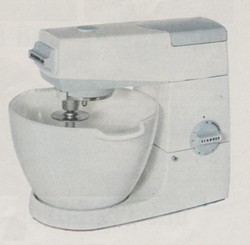We have an old Kenwood Chef A701 that’s hardly out of use in our kitchen. A few days ago, the gearbox went. I bought a reconditioned one on Ebay for £23, and this morning I made the time to do the repair.

As I tinkered away with my screwdriver, I reflected on how grateful I was that the designers of this machine had made sure it could be maintained by an idiot like me. I actually made our A701 by cannibalising two broken machines, and I have always been delighted by how easy it is to work on.
Perhaps it’s my confirmation bias, but it seems that machines like this no longer tend to be designed with maintenance in mind. In our consumer society, we’re encouraged to throw things away rather than repair them, and globalisation ensures that is often the apparently rational economic decision to take: paying a local repair man to fix your DVD player will cost more than popping down to Tesco and buying a new one. Thank goodness for those cheap Chinese factories, eh?
If we don’t design our manufactured goods for maintainability, perhaps it’s no wonder we often feel like we’re swimming against the tide trying to persuade people that it’s important in software.
It is called http://en.wikipedia.org/wiki/Planned_obsolescence
Engineers get paid to design products which should die just after the end of guarantee. Sick society …
What if software engineers did the same thing? Some do but without on purpose 😉
Our view of cheap electronics doesn’t apply to all the things that we make – for instance, we don’t dispose of houses when they need to be repaired. We value them sufficiently that we will spend money to fix them, extend them and adapt their usage. So, I wonder if there is a continuum of disposability based on attributes the availability, price and effort required – and, if so, if that applies to software development.
I’d had the same experience with an Indesit washer/dryer recently. Although certain parts can be cleaned during normal usage, the dryer part seems almost designed to become clogged up with enough use, needing either non-trivial maintenance or a replacement machine.
Got me a recond Bosch washer to replace 16yr-old
Panasonic recently. An Electrolux fridge/freezer
kept going 25 years, surviving house-move, too.
Let’s not forget that our affluent society is founded on consumerism. If we all stopped replacing things so often the economy would crash. So if we want a new model we need to bear that in mind. We make little decisions every day to buy the cheaper brand that is fueling this. We want more and now and if we buy 5 over 10 years that is suiting us better than buying one and paying more up front.
Having said that, agree with your thoughts. I think it comes to re-engineering, you can have it faster but it won’t last so keep re-engineering and understand this part of your process is as fundamental as the creation.